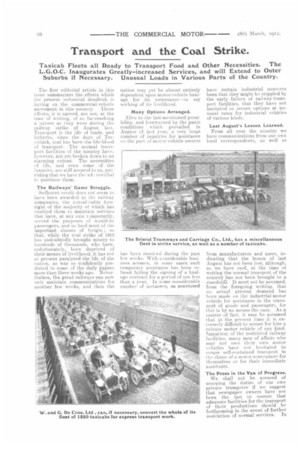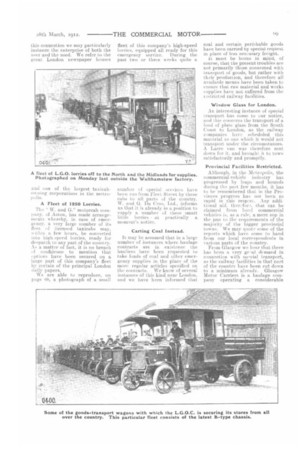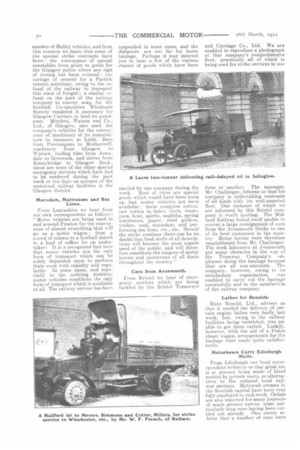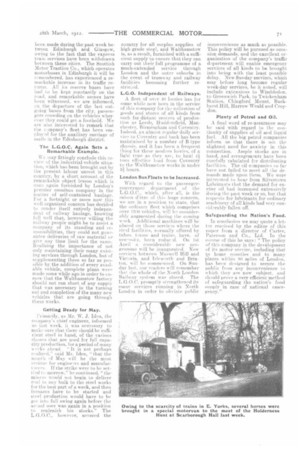Transport and the Coal Strike.
Page 4

Page 5

Page 6

Page 7

If you've noticed an error in this article please click here to report it so we can fix it.
Taxicab Fleets all Ready to Transport Food and Other Necessities. The L.G.O.C. Inaugurates Greatly-increased Services, and will Extend to Outer Suburbs if Necessary. Unusual Loads in Various Parts of the Country.
The first editorial article in this issue summarizes the effects which the present industrial deadlock is having on the commercial-vehicle movement in this country. These effects, it is agreed, are not, at the time of writing, of so far-reaching a nature as they were during the railway strike of August last. Transport is the life of trade, and hitherto, since the days of Trevithick, coal has been the life-blood of transport. The normal transport facilities of the country have, however, not yet broken down to an alarming extent. The necessities of life, and even some of the luxuries, are still assured to us, providing that we have the wit ,rewithal to purchase them.
The Railways Game Struggle.
Sufficient credit does not seem to have been awarded to the railway companies, the consid:n.able foresight of the majority of which has enabled them to maintain services that have, at any rate tAnporarily, served the purposes of would-be passengers, and to haul most of the important classes of freight ; so that, while the coal strike of 1912 has undoubtedly brought misery to hundreds of thousands, who have, unfortunately, been deprived of their means of livelihood, it has not at present paralysed the life of the nation, as was so confidently predicted in some of the daily papers more than three weeks ago. Nevertheless, the great railways can now only maintain communications for another few weeks, and then the nation may yet be almost entirely dependent upon motor-vehicle haulage for its sustenance—to say nothing of its livelihood, Many Options Arranged.
Alive to the last-mentioned possibility, and forewarned by the panic conditions which prevailed in August of last year, a very large number of inquiries for assistance on the part, of motor-vehicle owners has been received during the past few weeks. With considerable busi. ness acumen, in some cases such temporary assistance has been refused failing the signing of a haulage contract for a period of not less than a year. In some considerable number of instances, so convinced have certain industrial concerns been that they might be crippled by the early failure of railway-transport facilities, that they have not hesitated to secure options at unusual rates for industrial vehicles of various kinds.
Last August's Lesson Learned. From all over the country we have communications from our own local correspondents, as well as from .manufacturers and users, indicating that the lesson of last August has not been lost, although, as we have said, at the time of writing the normal transport of the country has not been brought to a standstill. It must not be assumed, from the foregoing writing, that no actual present demand has been made on the industrial-motor vehicle for assistance in the transport of goods and passengers, for this is by no means the ease. As a matter of fact, it may be assumed that at the present Lime it is extremely difficult to secure for hire a private motor vehicle of any kind. Impatient of the restricted railway facilities, many men of affairs who may not own their own motor vehicles have not hesitated to secure self-contained transport in the shape of a. motor conveyance for themselves or for their immediate assistants.
The Press in the Van of Progress.
We shall not be accused of usurping the duties of our own private trumpeter if we suggest that newspaper owners have not been the last to ensure that adequate facilities for the transport of their productions should he forthcoming in the event of further restriction of normal services. In this connection we may particularly instance the enterprise of both the user and the used. We refer to the great London newspaper houses and one of the largest taxicabowning corporations in the metropolis.
A Fleet of 1250 Lorries.
The '' W. and G." motorcab company, of Acton, has made arrangements whereby, in case of emergency. a very large number of its Heel, of licensed taxicabs may, ithin a few hours, be converted into highspeed lorries, ready for despatch to any part of the country. As a. matter of fact, it is no breach of confidence to mention that options have been secured on a large part of this company's fleet by certain of the principal London daily papers.
We are able to reproduce, on page 68, a photograph of a small fleet of this company's high-speed lorries, equipped all ready for this emergency service. During the past two or three weeks quite a number of special sCi'Viel'S have been run from Fleet. Street by these cabs to all parts of the country. W. and G. Du Cros, Ltd., informs us that it is already in a position to supply a number of these smart little lorries • at practically a moment's notice.
Carting Coal Instead.
It may be assumed that in a large number of instances where haulage contracts are in existence the hauliers have been requested to take loads of coal and other emergency supplies in the place of the more regular articles specified on the contracts. We know of several instances of this kind near London, and we have been informed that coal and certain perishable goods ha,ve been carried by special request in place of less necessary freight.
It must be borne in mind, of course, that the present troubles are not primarily those connected with transport of goods, but rather with their production, and therefore all available means have been taken to ensure that. raw material and works supplies have not suffered from the restricted railway facilities.
Window Glass for London.
An interesting instance of special transport has c,orne to our notice, and this concerns the transport of a load of plate glass from the South Coast to London, as the railway companies have scheduled this material as one which it would not transport under the circumstances. A Lacre van was therefore sent down for it. and brought it to town satisfactorily and promptly.
Provincial Facilities Restricted.
Although, in the Metropolis, the commercial-vehicle industry has progressed by leaps and bounds during the past few months, it has to be remembered that in the Provinces progress has not been so rapid in this respect. Any additional aid. therefore, that can be claimed from local commercial vehicles is, as a rule, a mere sop in the pan to the requirements of the majority of the bigger provincial towns. We may quote some of the reports which have come to hand from our local correspondents in various parts of the country.
From Glasgow we hear that there has been a very great demand in connection with swot& transport, as the railway facilities in that part of the country have been cut down to a minimum already. Glasgow Motor Carriers is a haulage company operating a considerable number of Halley vehicles, and from this concern we learn that some of the special strike contracts have been : the conveyance of special constables from point to point for the Glasgow police where any sign of rioting has been evinced ; the cartage of cement for a Partick cement merchant., owing to the refusal of the railway to transport this class of freight ; a similar refusal on the part of the railway company to convey soap for the Scottish Co-operative Wholesale Society rendered it necessary for Glasgow Carriers to lend its assistance. Mirrlees, Watson and Co., Ltd., of Glasgow, also used the company's vehicles for the conveance of machinery of its manufacture to steamers at Leith. Beer from Prestonpans to Motherwell, machinery from Glasgow to Wishaw, roofing tiles from. Annadale to Greenock, and stoves from Bonnybridge to Glasgow Dock : these are some of the other special emergency services which have had to be rendered during the past week or ten days on account of the restrict,ed railway facilities in the Glasgow district.
Macadam, Mattresses and Sea Lions.
From Lancashire we hear from our own correspondent as follows: "Motor vehicles are being used in and around Preston for the conveyance of almost everything that will go on a motor wagon ; from a crowd of miners to a football match to a load of coffins for an undertaker ! It is a recognized fact here that motor vehicles are the only form of transport which can be solely depended upon to perform their work with rapidity and regularity. In some cases, and especially in the outlying districts, motor vehicles constitute the only form of transport which is available at all. The railway service has been suspended in some cases, and the distances are too far for horse haulage. Perhaps it may interest you to hear a few of the various classes of goods which have been
carried by one company during the week. Most of them are special goods which would have been hung up had motor vehicles not been available ; these comprise cotton, raw cotton in bales, cloth, waste, yarn, beer, spirits, naphtha, spring mattresses, paper, steel girders, timber, coal, macadam, and performing sea lions, etc., etc. Should the strike continue there can be no doubt that food stuffs of all descriptions will become the most urgent need of the public, and will therefore constitute the cargoes of motor lorries and motorvans of all kinds throughout the country."
Corn from Avonmouth.
From Bristol we hear of emergency services which are being tackled by the Bristol Tramways
and Carriage Co., Ltd. We are enabled to reproduce a photograph of this company's comprehensive fleet, practically all ofwhich is being used for strike services in one form or another. The manager, Mr. Challenger, informs us that his company is undertaking contracts of all kinds with its well-assorted fleet. One instance of which we are informed by this Bristol company is worth quoting. The Midland Railway found itself unable to convey a large consignment of corn from the Avorunouth Docks to one of its best customers in the country. Motor lorries were therefore requisitioned from Mr. Challenger. The dock labourers at Avonmouth put many obstacles in the way cf the Tramway Company's employees doing the haulage because they are all non-unionists. The company, however, owing to its satisfactory organization, was enabled to carry out the haulage successfully and to the satisfaction of the railway company.
Lathes for Renolds.
Hans Renold, Ltd., advises us that it needed the delivery of certain engine lathes very badly last week, but, owing to the railway facilities being restricted, was unable to get them carted. Luckily, however, with the aid of a Foden steam wagon, arrangements for the haulage were made quite satisfactorily.
Motorbuses Carry Edinburgh Mails.
From Edinburgh our local correspondent writes to us that great use is at, present being made of hired motors by private users, as alternatives to the reduced local railway services. Motoreab owners in the Scottish capital have been very Nly employed in such work. Orders are also reported for many journeys of much greater extent, some particularly long runs having been carried out already. One owner relates that a number of runs have been made during the past week between Edinburgh and Glasgow, owing to the fact that the express train services have been withdrawn between these cities. The Scottish Motor Traction Co., which operates motorbuses in Edinburgh it will be r..,mernbered, has experienced a remarkable increase in its traffic returns. All its reserve buses have had to be kept constantly on the road, and remarkable scenes have been witnessed, we are informed, on the departure of the last outgoing buses from the city. passengers crowding on the vehicles wherever they could get a foothold. We are also interested to remark that the eempany's fleet has been employed for the auxiliary carriage of mails in the Edinburgh district.
The L.G.O.C. Again Sets a Remarkable Example.
Wc :nay fittingly conclude this review of the industrial-vehicle situation, which has been brought out by the present labour unrest in this country, by a short account of the remarkable object lesson which is once again furnished by London's premier omnibus company in the matter of self-contained haulage. Poe a fortnight or more now this well organized concern has decided to render itself entirely independent of railway haulage, knowing full well that., however willing the railway people might be to assist a. company of its standing and responsibilities, they could not guarantee deliveries of raw material or give any time limit for the same. Realizing the importance of not only maintaining their many existing services through London, but. of supplementing these so far as possibleby the addition of every available vehicle, complete plans were made some while ago in order to ensure that the Walthamstow factory should not run short of any supply that was necessary in the turning out and completion of the many new vehicles that are going through these works.
Getting Ready for May.
Primarily, as Mr. W. J. Idea, the co.opany's chief engineer, informed us last week, it was necessary to make sure Ihat there should he sufficient stool in hand, of the various classes Ihat are used for full capacity production, for a period of many
'ek ilinad. 'It is not perhaps roalizial,'" said Mr. Iden, "that the month of May will be the most serious for engineers and manufacturers. If the strike were to be settled t iemorrow," he continued. "the miners would not begin to deliver coal io any bulk to the steel works for the best part of a week, and then furnaces have to be started and steel production would have to be get into full swing again before the ac nal user was again in a position to replenish his stocks." The L.G.O.C., however, scoured the
country for all surplus supplies of high-grade steel, and Walthamstow is, as a. result, furnished with a sufficient supply to ensure that they can carry out their full programme of a much-extended service through London and the outer suburbs III the event of tramway and railway facilities becoming further restriced.
L.G.O. Independent of Railways.
A fleet of over '10 lorries has for some while now been in the service of this company for the collection of goods and stores of all kinds from such far dilstant, centres of produeLien as Leeds, Huddersfield, Manchester, Birmingham and Coventry. Indeed, an almost regular daily service to Coventry and back has been maintained by a number of B-type chassis, and it has been a frequent thing for these modern lorries, of a light type as they are, to haul 4i tons effective load from Coventry to the Waltham:4°w works in under 51 hours.
London Bus Fleets to be Increased With regard to the passengerconveyaoce department of the L.G.O.C., which, after a.11, is the raison d'être of this huge concern, we are in a position to state, that the ordinary fleet which comprises over lam vehicles. will be considerably augmented during the corning week. Additional machines will be placed on those servic:e; where the rival faciilities, normally offered by tubes. trains and trains, have, of necessit y. been reduc d. On 1st A oril a considerable new programme will be inaugurated. New servicls between Muswell Hill and Victnria. and Tslewerth and Brixton, will be commenced. On Sunday last, our readers vill remember thnl the whole of the North London Railway system was closed. The L.G.O.C, promptly strengthened its mansservices running in North London in order to obviate public
inconvenience as much as possible. This policy will be pursued as occasion demands, and the excellent organization of the company's traffic department will enable emergency services of all kinds to be brought into being with the least possible delay. New Sunday services, which may before long become regular week-day services, be it noted, will include extensions to Wimbledon. to Greenwich Park, to Twickenham Station, Chingford Mount. Buckburst Hill, Harrow Weald and Croydon.
Plenty of Petrol and Oil.
A final word of re-assurance may be said with regard to the continuity of supplies of oil and liquid fuel. All the big petrol companies inform us that there is not the slightest need for anxiety in this connection. Ample stocks are in hand, and arrangements have been carefully tabulated for distributing facilities. The oil companies so far have riot failed to meet, all the demands made upon them. We were interested to hear from Silvertown Lubricants that the demand for engine oil had increased extensively during the paet week or so, hut that respiests for lubricants for ordinary machinery of all kinds had very considerably fallen off.
Safeguarding the Nation's Food.
In conclusion we may quote a letter received by the editor of this paper from a director of Carter. Paterson and Co., Ltd. In the course of this he says: " The policy of this company in the development of its motor service, including that to home counties and to many places within 80 miles of London, has been designed to secure the public from any inconvenience to which they are now subject. and shnuld prove a very efficient, method a safeguarding the nation's food supply in case of national emergency."




















